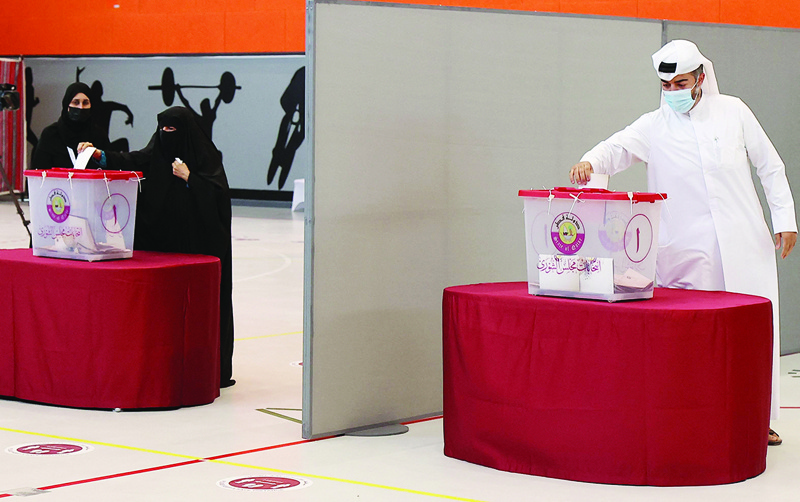DOHA: Qatar wrapped up its first legislative election yesterday with reports of a solid turnout. The vote was for 30 members of the 45-strong Shura Council, a body with limited powers that was previously appointed by the amir as an advisory chamber. More than a third of the 101 candidates dropped out of the race by yesterday afternoon, state television reported, apparently to support rival candidates.
"Where candidates realized that they have no shot to win a seat, they decided to endorse other candidates," said King's College London associate professor Andreas Krieg. After the withdrawals, there were 183 candidates in contention for the 30 elected seats. The remaining 15 will be appointed by the amir, although it is not known when they will be announced, or when the council will meet.
Average turnout was 44.3 percent in the 29 constituencies that had more than one candidate, state television reported, significantly higher than at 2019's municipal elections at which fewer than one in 10 of those eligible turned out. Across the Arabian desert peninsula nation, orderly queues of Qataris in national dress formed inside polling stations, mostly schools and sports halls.
In the 17th district, a chauffeur-driven Mercedes-Benz and a pearl white Rolls Royce SUV dropped off female voters at a primary school. Women were a majority among the steady stream of those casting ballots there at lunchtime. "At the start of the day, I heard many people say they wouldn't vote because there will be no change, but we saw many people," said voter Sultan Abdullah Al-Kuwari. "This is a good omen that there will be change."
The Shura will be allowed to propose legislation, approve the budget and recall ministers. But the amir, all-powerful in the world's largest exporter of liquefied natural gas, will wield a veto. In the working-class Najma suburb, candidates and voters paused for afternoon prayers on mats that had been set up inside the 10th district polling station which, like all others, was segregated by gender.
All candidates had to be approved by the powerful interior ministry and just one in 10 of the originally confirmed candidates were women. Most of Qatar's 2.5 million residents are foreigners, ineligible to vote. Candidates have to stand in electoral divisions linked to where their family or tribe was based in the 1930s, using data compiled by the then-British authorities.
In Al-Khor, a fishing town north of Doha, voters flocked to the polls in one district which has 13 candidates - making it one of the most competitive races in the country. "There are a large number of candidates... but for me the most important thing in the selection is competence," said voter Rashid Abdul Latif Al-Mohannadi, 37. A member of the election organizing committee told AFP they expected turnout in the polling stations under their supervision "will be large".
Diplomatic sources suggest families and tribes have already conducted internal ballots to determine who will be elected for their constituencies, which analysts say is a consequence of not having political parties. "This is a national duty to vote for the first elected Shura," said Abdullah Ahmed Saleh Al-Mahri Al-Mohannadi, a 52 year old legal consultant. "Voting must be for the right person... and not by the degree of kinship or family name."
Qataris number about 333,000, but only descendants of those who were citizens in 1930 are eligible to vote and stand, disqualifying members of families naturalized since then. Some members of the sizeable Al-Murrah tribe are among those excluded from the electoral process, sparking a fierce debate online and isolated protests.
Qatari women are also standing in the election, but in far lower numbers than men, prompting warnings that their influence on issues that affect women could be limited. "It's an extremely positive step that women are part of this process," said Elham Fakhro, senior Gulf analyst at the International Crisis Group. "However, I think we do have to limit our expectations (of their influence)... as there are only 28 women running for positions - it really shouldn't be surprising."
One candidate, Leena Al-Dafa, said her priorities if elected would be promoting education for women, supporting female teachers and the issue of citizenship for the children of Qatari women. Qatari citizenship can currently only be inherited by children from their fathers, meaning the children of a Qatari woman who marries someone of another nationality will not be citizens. This affects the children's ability to benefit from lavish grants, land allocations and other state support in the gas-rich emirate.
Fakhro suggested the amir could directly appoint women "to improve the gender balance" if none or few are elected - similar to what happened in Bahrain's legislative election. Representation of women in Qatar is stronger than in its Gulf neighbors, with the health ministry led by a woman and the foreign ministry represented by a spokeswoman. Women also hold prominent roles in the World Cup organizing committee as well as philanthropy and the arts, medicine, law and business. - AFP



